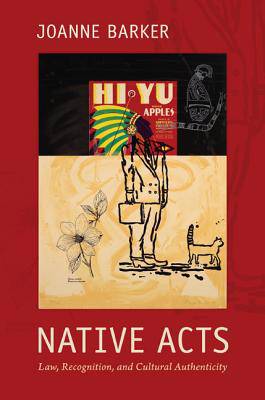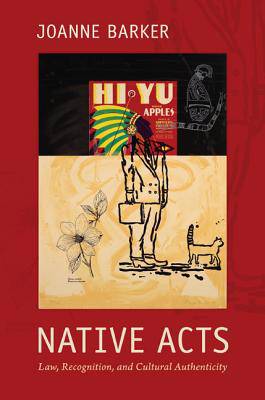
- Afhalen na 1 uur in een winkel met voorraad
- Gratis thuislevering in België vanaf € 30
- Ruim aanbod met 7 miljoen producten
- Afhalen na 1 uur in een winkel met voorraad
- Gratis thuislevering in België vanaf € 30
- Ruim aanbod met 7 miljoen producten
Zoeken
€ 56,45
+ 112 punten
Omschrijving
In the United States, Native peoples must be able to demonstrably look and act like the Natives of U.S. national narrations in order to secure their legal rights and standing as Natives. How they choose to navigate these demands and the implications of their choices for Native social formations are the focus of this powerful critique. Joanne Barker contends that the concepts and assumptions of cultural authenticity within Native communities potentially reproduce the very social inequalities and injustices of racism, ethnocentrism, sexism, homophobia, and fundamentalism that define U.S. nationalism and, by extension, Native oppression. She argues that until the hold of these ideologies is genuinely disrupted by Native peoples, the important projects for decolonization and self-determination defining Native movements and cultural revitalization efforts are impossible. These projects fail precisely by reinscribing notions of authenticity that are defined in U.S. nationalism to uphold relations of domination between the United States and Native peoples, as well as within Native social and interpersonal relations. Native Acts is a passionate call for Native peoples to decolonize their own concepts and projects of self-determination.
Specificaties
Betrokkenen
- Auteur(s):
- Uitgeverij:
Inhoud
- Aantal bladzijden:
- 296
- Taal:
- Engels
Eigenschappen
- Productcode (EAN):
- 9780822348511
- Verschijningsdatum:
- 12/08/2011
- Uitvoering:
- Paperback
- Formaat:
- Trade paperback (VS)
- Afmetingen:
- 157 mm x 234 mm
- Gewicht:
- 426 g

Alleen bij Standaard Boekhandel
+ 112 punten op je klantenkaart van Standaard Boekhandel
Beoordelingen
We publiceren alleen reviews die voldoen aan de voorwaarden voor reviews. Bekijk onze voorwaarden voor reviews.











